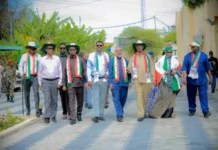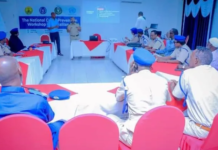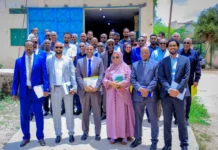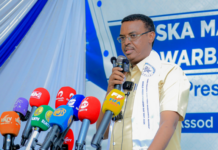1. SOMALILAND HISTORICAL BACKGROUND
Somaliland was a British Protectorate for 76 years (1884-1960). Somaliland was independent, recognized country before Somalia. Somaliland achieved independence from Great Britain on June 26, 1960 while Somalia achieved independence on July 1, 1960 from Italy. On June 26, 1960, Somaliland received International Recognition from 35 countries that included China, Egypt, Ethiopia, France, Ghana, Israel, Libya, the Soviet Union etc. Somaliland achieved independence and recognition before Somalia, Mauritania, Nigeria, Senegal, Gabon, Republic of the Congo, Chad, Ivory Coast, Burkina Faso, Benin, Sierra Leone, Uganda, Kenya, Algeria, Zambia, Zimbabwe, Namibia etc.
2. SOMALILAND REPUBLIC LOCATION
Somaliland is located in the Horn of Africa. It lies between 08°00′ – 11°30′ parallel North of the Equator (Latitudes) and between 42°30′ – 49°00′ Meridian East of Greenwich (Longitudes). It is bordered by the Red Sea to the North (Southern Coast of Gulf of Aden), Djibouti to the West, Ethiopia to the South, and Somalia to the East. Somaliland has a coastline with the majority lying along the Gulf of Aden (Red Sea). The country is slightly larger than England, with an area of 176,000km² (110,000 sq. miles) and with a population around 5.8 million.
3. DISSOLUTION OF 1960 UNION WITH SOMALIA
Sharing ethnicity, religion, language, culture, traditions, color etc do not determine the creation of union or federation or preserve the existence or survivability of union or federation but only fair power-sharing and justice determine the success and survivability of union or federation and that is what Somalia failed to understand and respect during the 30 years of the failed union (1960-1990).
Even though Somaliland was the parent country that invited Somalia for sharing union with Somaliland for achieving independence before Somalia, Somalia never respected the terms and conditions of the union by subjecting Somaliland people to 22 years (1960-1982) of power-sharing denial, oppression and injustice and 8 years (1982-1990) of all kinds of human rights abuses and heinous crimes such as suppression, persecution, imprisonment, genocide and destructions. Those two historical facts ended the union between Somaliland and Somalia in May 1991 after devastating eight-year- long civil war (1982-1990) between Somaliland and Somalia. Somaliland people reclaimed their independence of June 26, 1960 again. One wonders why people of Somalia still pursue the revival of the disastrous union knowing power-sharing denial for 22 years and atrocities for 8 years. Unions are dissolvable but independence is indissolvable. June 26, 1960 is indissolvable.
Like Somalis, Arabs share ethnicity, religion, culture, color, traditions etc but , at the same time, disagreed to share union or federation. White Arabs have nearly eighteen countries (18) while Somalis have five (5). The Jordanian or Iraqi man or woman can not enter Egypt without legal documents (Passport and Visas) to get job or rank or any other Arab country. Every Arab country is independent of other Arab countries with each country having their independent state, government, flag and recognition based on their colonial borders. Greater Arab, like Greater Somalia, does not work in the Arab World to enter another Arab country. Citizens of Morocco or Libya are not citizens of Greater Arab but they are citizens of their own countries and Somalis are not different from them. Citizens of Somaliland or Somalia are not citizens of greater Somalia.
4. AFRICAN BORDERS ARE BASED ON LAND, NOT ON CLAN LINEAGE
There are no clan or tribal borders in Africa but there are state or national borders only. Borders of all African countries are based on land, not on clan lineage or tribal origin. The territory, independence and recognition of each African country is defined by its colonial power-drawn borders. The political map of Africa showing African countries was made by Europe, not by Africans. Somaliland territory, independence and recognition is based on Somaliland British Protectorate Borders.
The borders of Djibouti, Somaliland and Somalia have internationally the same legitimacy and status for being all colonially-drawn borders defining their independence, territory and nation as the rest of Africa. European Colonial Borders define nationalism, independence, statehood and diplomatic recognition of each country in Africa, Asia, and Arab World.
5. SOMALILAND MILITARY DOCTRINE
Somaliland Republic is a peace-loving country and respects its neighbours and cooperate with them on security and on bilateral social and economic developments. The military doctrine of Somaliland states that any entity, like Puntland Province of Federal Somalia, which tries to claim parts of Somaliland to change its borders on the basis of tribal lineage or any country which tries to dismember Somaliland territory for aggression shall be confronted with force to repel and defeat such hostile attempt intended to undermine the territorial integrity and national unity of Somaliland Republic.
Puntland Administration of Federal Somalia continues violating the internationally recognized borders of Somaliland Republic based on Somaliland British Protectorate Borders claiming Eastern Sool, Buhodle and Eastern Sanaag on the basis of clan lineage – which is absolutely unacceptable. Somaliland Republic is committed to defend its country and people from foreign aggression. Somaliland Government will never allow Regional Administration of Puntland of Federal Somalia to participate in the talks between Somaliland Republic and Federal Somalia. Puntland was part of the former Italian Colony of Somalia and shares history and territorial borders with Somalia. The talks are not about clan lineage but about two countries. Puntland Administration is not different from Galmudug, Jubbaland, South-West Administrations etc of Federal Somalia.
Author: Ibrahim Hassan Gagale
August 6, 2023






































